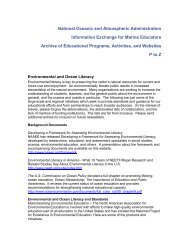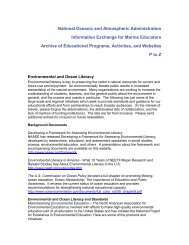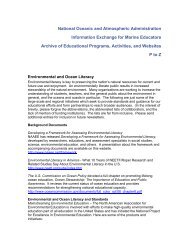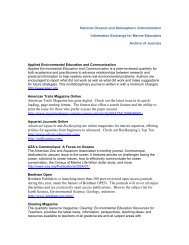Information Exchange for Marine Educators - Archive of Programs P-Z
Information Exchange for Marine Educators - Archive of Programs P-Z
Information Exchange for Marine Educators - Archive of Programs P-Z
Create successful ePaper yourself
Turn your PDF publications into a flip-book with our unique Google optimized e-Paper software.
to Climate Change and Educating <strong>for</strong> Sustainable Development, is available <strong>for</strong><br />
downloading from the website in English, Spanish, and French. The manual includes<br />
activities on beach debris, water quality, currents, and more.<br />
http://www.sandwatch.ca/index.php?option=com_content&view=category&layout=blog&i<br />
d=9&Itemid=4<br />
Santa Barbara Ocean Film Festival<br />
Santa Barbara’s Ocean Film Festival will be held October 22-23, 2008 in Santa Barbara,<br />
Cali<strong>for</strong>nia.<br />
http://www.ocean.com/index.asp?LocationID=311&CatId=311<br />
Satellite Observations in Science Education<br />
The Satellite Observations in Science Education website from the University <strong>of</strong><br />
Wisconsin promotes the teaching and learning <strong>of</strong> the Earth system through quality<br />
educational resources that make use <strong>of</strong> satellite observations. The website includes<br />
learning activities, resources useful to building your own learning activities, satellite data,<br />
and more.<br />
http://www.ssec.wisc.edu/sose/<br />
Satellites and Bleaching<br />
NOAA Coral Reef Watch <strong>of</strong>fers an online tutorial that takes the student through coral<br />
bleaching, satellite technology, and how we use satellite data to monitor <strong>for</strong> the<br />
conditions that cause bleaching. The tutorial uses non-technical language and can be<br />
useful <strong>for</strong> students, teachers, and others wanting to learn more about coral reefs and<br />
satellite technology. The lessons are tied to National Science Education standards <strong>for</strong><br />
use in the classroom.<br />
http://coralreefwatch.noaa.gov/satellite/education/tutorial/welcome.html<br />
Satellites and Orbits: an Introduction<br />
NOAA’s Satellite and <strong>In<strong>for</strong>mation</strong> Service takes complex satellite and orbit in<strong>for</strong>mation<br />
and trans<strong>for</strong>ms them into easy to understand concepts with lots <strong>of</strong> animation sure to<br />
catch a student's attention, <strong>for</strong> grades 8-12. Highlights include a short satellite history, a<br />
non-mathematical review <strong>of</strong> basic orbital physics, orbital terminology, and orbit types<br />
with a focus on Earth observation and environmental monitoring. Other features include<br />
a hands-on demonstration, a student activity, background in<strong>for</strong>mation and instructions.<br />
www.npoess.noaa.gov<br />
Satellite Resources<br />
NOAA's Satellites and <strong>In<strong>for</strong>mation</strong> Service manages data relating to the Earth and solar<br />
environments. The National Environmental Satellite, Data, and <strong>In<strong>for</strong>mation</strong> Service has<br />
compiled a website listing resources <strong>of</strong> interest to students and educators. Materials<br />
include posters and slide sets, teacher guides and quizzes, fact sheets and handouts.<br />
Links lead to numerous related sites, such as the World OceanAtlas, the Climatic Data<br />
Center, and sources <strong>of</strong> in<strong>for</strong>mation on sea ice, ice shelves and glaciers.<br />
http://www.nesdis.noaa.gov/outreach_edu.html<br />
Satellite Tagging <strong>of</strong> <strong>Marine</strong> Mammals and Turtles<br />
These satellite tagging units from WhaleNet can be used in learning different concepts,<br />
including geography, habitat use by organisms, math, map skills, comprehensive<br />
reading, and more. The active tags are highlighted, and over 155 archived satellite<br />
tagging events are available.






